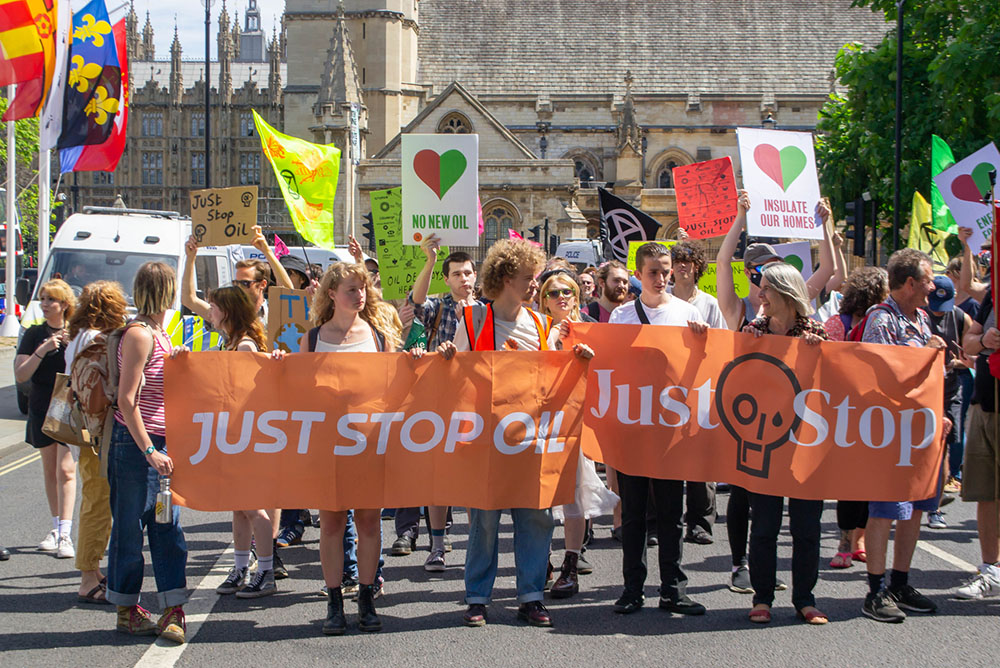
Lichfield Cathedral is seen in an aerial view of Lichfield, Staffordshire, England. It is the cathedral of the Anglican Diocese of Lichfield, which recently announced its divestment from fossil fuels. (Wikimedia Commons/West Midlands Police)
Throughout the 40 days of Lent this year, a group of Christians in the United Kingdom have prayed that their dioceses give up something permanently: financial holdings in fossil fuels.
As the liturgical season of penance and fasting nears its end, it turns out some of their prayers have been answered.
The "40 Days, 40 Dioceses" campaign is led by Operation Noah, a London-based Christian climate group. At the start of the year, organizers realized that 27 of the 42 dioceses in the Church of England and 13 of the 22 Catholic dioceses within U.K. borders had not committed publicly to fossil fuel divestment. Upon adding them up, they had a formula for a new Lenten initiative.
Each day during Lent, campaigners have highlighted one of the non-divested dioceses, directing prayers and social media pleas for each to publicly commit to shift its finances away from fossil fuels forever. Throughout the season, grassroots campaigners in each diocese have also sought meetings with church leadership to discuss divestment.
"The campaign has been pleasantly surprising," Bokani Tshidzu, head of Operation Noah's Bright Now campaign for fossil fuel divestment and impact investing, told EarthBeat. "We've been calling for some of these changes for a while now, so it's really gained so much momentum. And it's really credit to the campaigners on the ground."
Ending investments in coal, oil and gas companies has been a major focus for climate activists, who seek not only to cut the companies' financial lines but to rescind what Tshidzu calls their "social license" to extract more coal, oil and gas.
"We're trying to say it's actually not OK to invest in fossil fuel companies, just like it's not OK to invest in some of the other things that we've said are not great," like payday loans or tobacco, said Cameron Conant, communications officer for Operation Noah. "It's not great for society. And we don't want to endorse it."
Burning fossil fuels is the primary source of heat-trapping greenhouse gas emissions that drive climate change. Under the Paris Agreement, nearly every nation has committed to deep emissions cuts in order to limit global temperature rise to as low as 1.5 degrees Celsius (2.7 degrees Fahrenheit), and with it avert more catastrophic climate impacts.
To achieve that goal, the United Nations Intergovernmental Panel on Climate Change, the world's top climate science body, has stated global emissions need to peak no later than 2025, be slashed 43% by 2030, and reach net-zero by midcentury. And the International Energy Agency has said meeting the 1.5 C temperature target requires no new fossil fuel projects.

Protesters against climate change and the fossil fuel industry march in Parliament Square in London July 23, 2022. (Dreamstime/Jessica Girvan)
Those scientific reports have fueled organizations like Operation Noah to press for the sake of current and future generations a rapid energy transition away from fossil fuels and toward cleaner alternatives, including through divestment.
"The point is that we don't just need more renewable energy. We need less oil and gas," Conant said.
It's that message that Operation Noah's 40 Days, 40 Dioceses grassroots campaign has sought to deliver. And it has yielded some results.
In late January, before the campaign formally kicked off, the Anglican Diocese of London announced it had changed its ethical investment policy to bar future investments in oil and gas companies, and that it would review its current holdings, estimated at $62 million.
In its statement, the diocese said it reached the decision in response to "concerns raised within the Diocese and the wider Church of England over the growing impact of climate change."
"The revised policy includes a total exclusion for fossil fuels given their conflict with the missional aims and objectives of the Church, particularly its responsibility for stewardship," the diocese said.
Operation Noah saw the move by the London Diocese as a potential tipping point, as the diocese is one of the most prominent within the Church of England and its decision-making could sway others.
'It's been so powerful to see the example of Christians calling out their dioceses, and finally getting a response.'
—Bokani Tshidzu
Along with London, two other dioceses, Lichfield and Rochester, also announced divestment days before the campaign began. During Lent, the Hereford Diocese announced it will fully divest from fossil fuels by the end of 2023, and the Anglican dioceses of Canterbury, Coventry and Ely each made public that they had ended investments in fossil fuels and would not invest in them in the future.
Twenty-three dioceses in the Church of England in the U.K., or more than half, have fully divested from fossil fuels as of April 3. Of the remaining 19 Anglican dioceses, 13 do not hold investments in fossil fuels but have not committed to refraining in the future, and six continue investing in fossil fuels.
Among Catholic dioceses, the Northampton Diocese has been alone in making public during the Lenten season its full divestment from fossil fuels, announcing on Feb. 28 — the day it was highlighted by the 40 Days campaign — that it had made the decision in October.
And the Westminster Diocese, which includes London and is home to England's largest Catholic population, reiterated in February that it has divested from electrical utilities and fossil fuel companies not in line with the Paris Agreement goals, and "at this time" does not currently hold shares in any fossil fuel companies. In a carbon neutrality progress report last month, the Westminster Diocese added that it continues to engage other companies as shareholders on climate issues, and as of the end of 2022 had directed 3% of its portfolio to impact investing, including renewable energy.
To date, 10 Catholic dioceses in England and Wales have fully divested, while 10 continue to have holdings in fossil fuels. Nearby, the Scottish bishops announced in 2021 that their bishops' conference and all eight dioceses and archdioceses would divest.
"It's been so powerful to see the example of Christians calling out their dioceses, and finally getting a response," Tshidzu said.
But not all who have been called out in the campaign have decided to divest.
In the case of the Cardiff Archdiocese, campaigners received a reply from the chief operating officer, who said it will continue to try to engage companies like Shell and BP as a shareholder. He also shared a copy of 'Mensuram Bonam': Faith-Based Measures for Catholic Investors, a resource issued in 2022 by the Pontifical Academy of Social Sciences.
Climate activists like Tshidzu question how effective shareholder advocacy can be, as fossil fuel companies have been slow to change and they continue to expand extraction, even as some have publicly touted efforts to reduce their climate impacts. That has led churches with larger footprints in the U.K., like the Church of England and the Methodist Church, to see less value in shareholder engagement, including in the London Diocese, which noted that past approach in its divestment announcement.
"The pace of movement is far too slow, and we're not really seeing the effectiveness of that engagement strategy, especially when the dioceses are such minor shareholders," Tshidzu said.
As for the greater movement so far within Anglican dioceses compared to Catholic dioceses, Operation Noah points to the synod structures in the Church of England that provide moments for discussions around ethical investing to take place.
Advertisement
"I'm often very jealous of these moments where people can have these discussions more explicitly," said Tshidzu, who is Catholic. "But it doesn't mean that as members of the [Catholic] church, we have no voice or that we just sit there and sort of follow hierarchy."
The dioceses that have announced decisions to divest are expected to be included as part of a joint fossil fuel divestment announcement on April 20 ahead of Earth Day. Operation Noah is organizing the announcement alongside Laudato Si' Movement, GreenFaith, Green Anglicans and the World Council of Churches.
Looking ahead, Operation Noah is planning a new initiative to gather more information on the majority of faith-based institutions outside the U.K. that have not made a public divestment announcement. In the U.K., diocesan financial records are publicly registered, which has allowed the campaign to more easily identify which were invested in fossil fuels and which were not.
Tshidzu hopes that better data, combined with growing awareness in recent years around responsible investment for people and the planet, will lead to further breakthroughs of faith communities opting to exit the fossil fuel market, both in the U.K. and beyond.
"If we want to support life on Earth for the current and future generations, we have to start thinking about what activities make this a place we want to be flourishing, and what activities reduce that and move away from that," she said.








